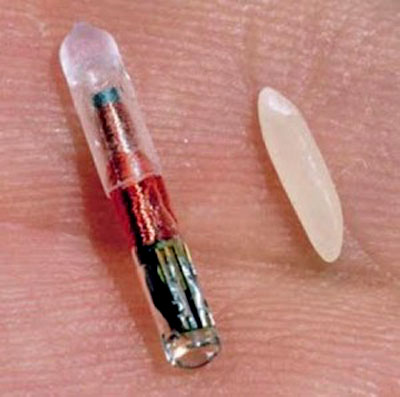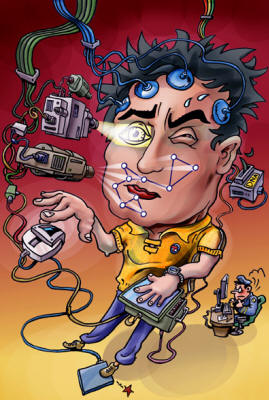|

by Michael Snyder
January 18, 2012
from
EndOfTheAmericanDream Website

As technology continues to advance at an exponential rate, will we
someday find ourselves living in a "scientific dictatorship" where
virtually everything that we do, say and think is monitored and
controlled by technology?
To many of you that may sound like a
wild assertion, but just keep reading. Our world is changing faster
than ever before, and scientists have some absolutely wild things
planned for our future. As you read this, they are feverishly
developing edible microchips, cutting edge biometric identity
systems, and mind reading computers.
Many futurists envision a world where
someday nearly all humans are embedded with microchips and have
thousands of tiny nanobots living inside of them.
The idea is that we can "take control of
our own evolution" and use technology to "improve" humanity. But
very few of those futurists address the potential downsides. The
truth is that all of this technology could one day be used by a
totalitarian government to establish a dystopian nightmare where
nobody has any liberties and freedoms whatsoever.
The world of tomorrow is not going to be anything like the world of
today, and most people have no idea how dramatically the world is
changing.
For instance, many people have never even heard of "edible
microchips".
Unfortunately, they are not some wild idea that some wacky
scientists are hoping to develop in the future.
They are already here, and they are about to be marketed to the
public in the UK.
The idea is that these edible microchips will help doctors monitor
your 'health conditions' and the 'medicines' that you are taking.
The
following comes from a
recent article in the Daily Mail...
The sensor, which contains no
battery, antenna or radio, creates a unique digital signature
that is picked up and recorded by a patch attached to the
patient's shoulder.
The patch, which also monitors bodily functions such as heart
rate and temperature, sends this encrypted information to
blue-tooth enabled smartphones or computers owned by the patient
and their doctors and carers.
In this way, both patients and their doctors can work out
exactly which pills have been taken. Medics can also interpret
whether the patient is sleeping well, or taking enough exercise
using the information transmitted from the patch.
But could such edible microchips be used
for more nefarious purposes in the future?
Of course.
And scientists are developing many other new ways for you to be
tracked by technology as well.
For example, do you remember in the movie "Minority Report" how Tom
Cruise had to cover his eyes because he was being tracked by them
wherever he went?
Well, it won't be too long before that becomes a reality in our
world.
IBM is aggressively developing new biometric identity systems that
could significantly change the way that we live our lives.
The
following is from a
recent IBM press release...
You will no longer need to create,
track or remember multiple passwords for various log-ins.
Imagine you will be able to walk up to an ATM machine to
securely withdraw money by simply speaking your name or looking
into a tiny sensor that can recognize the unique patterns in the
retina of your eye. Or by doing the same, you can check your
account balance on your mobile phone or tablet.
Each person has a unique biological identity and behind all that
is data. Biometric data - facial definitions, retinal scans and
voice files - will be composited through software to build your
DNA unique online password.
Referred to as multi-factor biometrics, smarter systems will be
able to use this information in real-time to make sure whenever
someone is attempting to access your information, it matches
your unique biometric profile and the attempt is authorized.
When biometric identity systems become
widespread enough, authorities will pretty much know where you are
and what you are doing at all times.
But even more frightening is something else that IBM is developing
right now. IBM scientists are actually working really hard to
develop mind reading computers.
The idea is that someday we will all be
able to control various electronic devices simply by using our
thoughts...
IBM scientists are among those researching how to link your brain to
your devices, such as a computer or a smartphone.
If you just need
to think about calling someone, it happens. Or you can control the
cursor on a computer screen just by thinking about where you want to
move it.
Scientists in the field of bioinformatics have designed headsets
with advanced sensors to read electrical brain activity that can
recognize facial expressions, excitement and concentration levels,
and thoughts of a person without them physically taking any actions.
The following promotional video from IBM describes some of these
emerging technologies in more detail:
But IBM is not the only one working on
mind reading technology.
Several video game makers have been attempting to develop games that
you control not with a joystick or a gamepad but rather with your
brain waves (below video).
This all sound fascinating, but could such technology someday be
adapted for other purposes?
Instead of us controlling the electronic devices that we connect our
brains to, could they instead be used to control us someday?
Being more "connected" is not necessarily a good thing.
People have been looking for ways to stay more "connected" to the
Internet for a long time, and many futurists are now suggesting that
we should find a way to directly connect our brains to the Internet.
An article on the website of the Science
Channel
put it this way...
What if it were possible to connect your brain to the Internet,
either wirelessly or through a cable, download digital information
at high speed, and then translate it automatically into a chemical
form that could be stored by your brain cells as memory?
The same article explained what some of
the benefits from such a connection might be...
If you could pump data directly into your gray matter at, say, 50
mbps - the top speed offered by one major U.S. internet service
provider - you’d be able to read a 500-page book in just under
two-tenths of a second.
-
But wouldn't this be potentially dangerous?
-
If we found a way to connect our brains to the Internet 100% of the
time, couldn't someone potentially "download" damaging programs or
"viruses" directly into our heads?
That is something to think about.
A British researcher named Mark Gasson
infected an RFID chip in his
hand with a computer virus and found that the virus-infected chip
implanted in his hand was able to contaminate external systems.
So wouldn't the danger be far greater if we connected our brains
directly to the Internet?
I don't know about you, but I don't plan on ever connecting my brain
directly to the Internet and I don't plan on ever letting anyone put
an RFID chip inside of me either.
Unfortunately, the use of implantable RFID chips in humans and
animals is rapidly spreading. A lot of employers now require that
their employees take them for identification purposes.
Some cities
in the U.S. are actually
making it mandatory to put microchips into
your pets.
Increasingly, RFID implants are being
injected into thousands of
elderly Americans living with Alzheimer's disease who are at risk of
wandering off and getting lost. In addition, RFID chips are being
implanted into many people who are chronically ill so that doctors
can access their medical information quickly in an emergency.
And many companies are working hard to make it even easier to
implant RFID chips into humans and animals.
In fact, one company called Somark has developed a stunning
breakthrough in chipless RFID ink. Their "RFID tattoos" are applied
using a geometric array of micro-needles and a reusable applicator.
Somark says that it is incredibly easy to apply one of these RFID
tattoos. They say that it only takes about 5 to 10 seconds to tattoo
an animal or a human. Once the tattoo has been applied, an RFID
reader can read it from up to four feet away.
Frightening stuff.
But some say that there might be an even easier way than that to
keep track of everybody in the future.
IBM is actually working on a "bar code reader" that
can read your
DNA.
The following is from a Fox News
article about this project...
The DNA Transistor is a project from IBM Research that aims to
advance personalized medicine, by making it simpler (and much
cheaper) to read an individual's unique DNA sequence - the special
combination of proteins that makes you unlike anyone else.
The technology isn't finished yet, but its potential is
tantalizing
enough that IBM wanted to share it with the world. And the company
claims researchers are making progress.
Essentially a bar code reader for genes, the DNA Transistor is part
technique and part device. It consists of a 3-nanometer wide hole,
known as a nanopore, in a silicon microchip. A sensor in the pore
can read DNA and determine its unique makeup.
Our world is changing at a mind blowing pace right now.
The decisions that are made now are going to have a dramatic affect
on how the future plays out.
That is why so many of us are speaking out about how the government
is watching us and about how our liberties and our freedoms are
being taken away.
If we don't stand up for freedom and liberty right now, our children
may one day wake up in a world where they are so controlled by
technology that they are unable to do so.
Right now we are not too far away from the kind of world that
authors such as George Orwell once warned about.
This article will
conclude with a quote from his famous work
1984...
"It was terribly dangerous to let
your thoughts wander when you were in any public place or within
range of a telescreen.
The smallest thing could give you away. A
nervous tic, an unconscious look of anxiety, a habit of
muttering to yourself - anything that carried with it the
suggestion of abnormality, of having something to hide. In any
case, to wear an improper expression on your face...; was itself
a punishable offense.
There was even a word for it in Newspeak: facecrime..."

|


